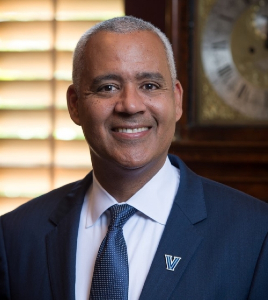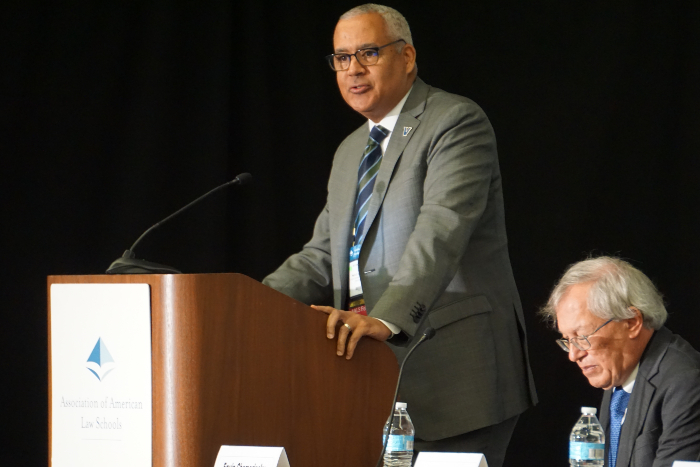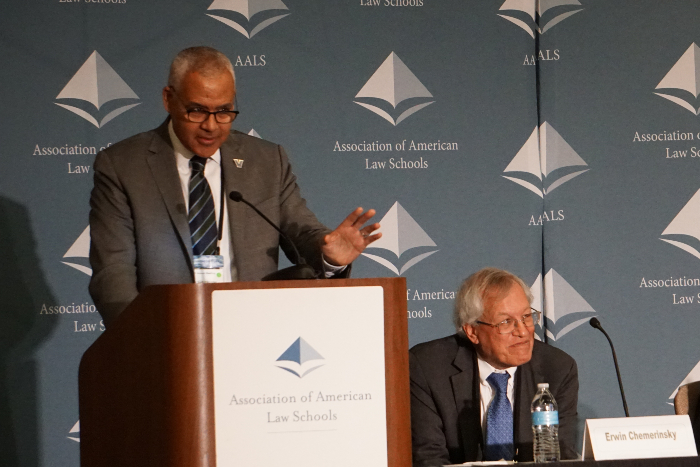More importantly, our unified response to the events of January 6 made it clear that the members of the AALS collectively agree that our democracy is the lifeblood of a free and fair society and that it is worth being defended with action and resolve.
We have a great country. But there are grave threats to it. Seventy-five percent of all voters, right, left, and center, believe our democracy is threatened. Extremism, anti-Semitism, racism, violence against LGBTQ people, and political violence persist. Mob violence threatens the rule of law. Election deniers and liars continue on their paths. And I am horrorstruck that we need to say a prerequisite to being President of the United States is to swear to uphold the constitution, not propose to terminate it.
The urgent question before us is how should AALS participate in defending our democracy? We have a greater role to play in ensuring the foundational tenets and norms of a civil democracy.
When we raise our collective voice, leaders listen. Media listen. So do our students, and our universities. Speaking out together against unlawful or anti-democratic actions and intentions plays an important role in educating not only our students, but the general public as well. The fine lines between First Amendment protections and the privileges and responsibilities of our democratic way of life must be explained to the public more forcefully in the interest of the common good.
We are an association that has the ability to influence the influencers. My appeal to you is not about politics, right, left, or center. It’s about what we can do together to defend democracy.
[O]ur unified commitment to the constitution and our joint knowledge, scholarship, and determination to defend our democracy is a powerful force.
Mark Alexander
There are nonpolitical messages we can deliver. There are actions we can and must take. We can have a meaningful and measurable impact on the future of our great democracy.
I cannot remember a time when the legal profession has had a higher profile and greater exposure or when lawyers were more in the news than over the last few years. Look around the room and you will likely spot someone you saw on national television just a few days ago offering explanations and insights into any number of subjects at the top of a news cycle.
There are 332 million people in this country and a mere 1.3 million of us are lawyers. Less than one-half of one percent of the U.S. population have the knowledge we have and are sworn to the Constitution as we are. Our outsized influence touches nearly every aspect of government, the economy, and society. We lawyers are elected officials, judges, CEOs, and C-suite executives throughout the private and public sectors. We are everywhere in places of prominence, power, and policy. Lawyers have shaped and will continue to shape our democracy.
What about us in legal academia? We are the shapers of the shapers – placing upon our shoulders a distinct responsibility to this country in ensuring that our democracy endures. How do we turn a spotlight on the meaning of the promise we make, our shared values, our commitment to the Constitution, the rule of law and civil norms? How do we use our outsized influence to defend and strengthen our democracy?
In the context of our work as law school faculty and staff, defending democracy means so much. Defending and teaching the rule of law. Also, teaching the centrality of our constitution. Further, defending democracy means imbuing respect for norms and traditions.
My theme is Defending Democracy. Our organization is the AALS. I believe the work of defending democracy is built on three pillars of every law school: curriculum, scholarship, and culture.
First, let’s consider curriculum. Are law school curricula serving our democracy as well as they should be? Can we better embrace our roles in educating lawyers for their roles in the ongoing work of forming a more perfect union? How do we ensure that both the spirit and objectives of the rule of law and the norms that uphold it are a substantive dimension of the educations we deliver? Can we do more than what we are currently doing?
The lawyers we are preparing today will take on extraordinary challenges in the years ahead. They must be prepared. We can review not only what we teach but also how we teach, asking ourselves if we are truly reinforcing the norms and standards of our democracy.
I am not suggesting that we shift curriculums in any particular direction. But I am urging that the intellectual essence of upholding the rule of law and the values it conveys belongs in every legal education.
This is not about me. Ultimately, it is about our association, and it is about you. I am very interested in hearing your ideas and considering how to fortify curricula in a society that is changing swiftly and issuing new challenges and opportunities every day. That is our collective challenge.
My second area of focus is scholarship. How does scholarship achieve greater prominence in the work of defending democracy and strengthening our republic in the 21st century?
There is exceptional scholarship being pursued by people throughout this room and throughout our law schools. As you know, my field is election law and constitutional law. All scholarship connects with and even reinforces our democracy – torts, civil procedure, criminal law, health law, intellectual property. You name it—it all connects with our system of laws. It is all part of our democracy. We are architects, engineers, and builders of legal solutions to complex problems in our nation.
Our scholarship is essential to the future of our democracy, our economy, and the wellbeing of all. The needs and expectations of this country and the world require diligent analysis and careful thought that require robust scholarship that promotes the evolution of our society. Judges, lawmakers, and lawyers depend on our scholarship to do their work.
To borrow from The Paper Chase, look to the right and look to your left – you are looking at some of the best legal minds in the country. How do we harness our knowledge and brainpower in the interest of defending democracy? That answer is in your hands.
The third area I am focused on is law school culture, and it may be the most important.
When I became the Dean at Villanova, I considered how I would shape my leadership agenda. Villanova’s motto of veritas, unitas, caritas and the culture of Villanova University converged with what my parents worked hard to instill in my sister and me throughout our upbringing — and what I try to bring with me wherever I go.
Allow me to recall a moment with my father that has never left me and that I try to honor every day. It is one of my favorite stories to tell about my life with Dad, going back to my teenage days. We lived in a townhouse—a rowhouse—on Capitol Hill in Washington, DC. We were going out one weekend day, running to the corner store to get some ice cream. Truly a favorite activity!
As usual, we walked out our back door, heading past our cars, parked in the alley behind the house. It was a quiet alley, and it was the quickest way to get to the corner store on East Capitol Street. As we walked through the alley, we came across a man by the garage behind a neighboring house. He was homeless. Life had not been good to him. He looked up at us and was startled, so he took a couple of steps back, now up against the garage itself. Dad looked him in the eyes, and said, “Good morning, sir.” The man, still somewhat startled, looked back, stood up a bit and said a simple “Good morning,” in return. Dad and I kept walking and 50 yards later, at the end of the alley, Dad turned to me and said, simply, “He was somebody’s baby one day.”
That moment with my father, has never left me. Dad saw the humanity in all. Dad had worked as Special Counsel to the President for civil rights. He also served as Chairman of the Equal Employment Opportunity Commission. And at that time, he was serving as Secretary of the U.S. Army. He had met presidents, dignitaries, the Pope, and more. But this homeless man also deserved dignity and respect—he was somebody’s baby once upon a time. In some ways these values may be universal, but frankly too few people live these values.
That immediate reflexive respect for human dignity that I saw in my father is at the heart of what is decent in our society.
My father showed respect for all. And I believe all deserve respect. Unfortunately, society has seemed to have lost the proprieties of human interaction. I fear that polarization and politics are eroding respect for one another; a basic commitment to our common good has withered.
I believe that the culture of our law schools sets the tone for how we will all participate in defending our democracy. So, at Villanova Law, we are consistently focusing on our law school culture to instill our values of veritas, unitas, caritas—truth, unity, and love. They are as much a part of the educational experience as the academic rigor we bring into the classroom every day. Our values are the currency of our culture. We pay a great deal of attention to culture because our learning environment is crucial to how students assimilate the principles of ethical practice and respectful civic engagement.
You might look at me and think that what I am talking about is a Catholic school thing or a religious thing. I contend it is a professional thing and a human thing. Seeking truth, under our oath to the constitution within the norms of society and with care for the dignity for every person must be an American lawyer thing.
I am so grateful that we are no longer conducting classes over Zoom. It’s pretty hard to build love and respect within a community when the experience of community is online. We had little choice but to function that way. Being back in person allows us to look each other in the eye in classrooms, to respect the fundamental dignity of each person. It allows us to break bread with each other in our homes, law school cafeterias, and restaurants.
It allows us to attend conferences like this one – in person, united in the spirit of academia. It allows us to have a discussion – even a heated one – in person, so that we don’t write that person off when we click the END button on our computer.



